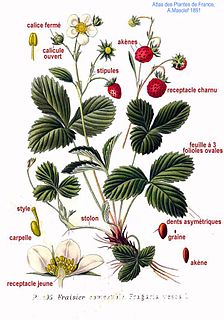
Fragaria is a genus of flowering plants in the rose family, Rosaceae, commonly known as strawberries for their edible fruits. There are more than 20 described species and many hybrids and cultivars. The most common strawberries grown commercially are cultivars of the garden strawberry, a hybrid known as Fragaria × ananassa. Strawberries have a taste that varies by cultivar, and ranges from quite sweet to rather tart. Strawberries are an important commercial fruit crop, widely grown in all temperate regions of the world.
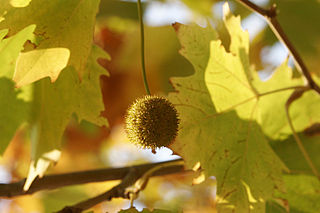
Platanaceae, the "plane-tree family", is a family of flowering plants in the order Proteales. The family consists of only a single extant genus Platanus, with eight known species. The plants are tall trees, native to temperate and subtropical regions of the Northern Hemisphere. The hybrid London plane is widely planted in cities worldwide.

Platanus is a genus consisting of a small number of tree species native to the Northern Hemisphere. They are the sole living members of the family Platanaceae.
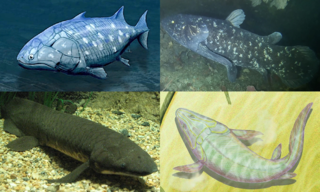
Sarcopterygii —sometimes considered synonymous with Crossopterygii —is a taxon of the bony fishes whose members are known as lobe-finned fishes. The group Tetrapoda, a superclass including amphibians, reptiles, and mammals, evolved from certain sarcopterygians; under a cladistic view, tetrapods are themselves considered a group within Sarcopterygii.

The Asian green bee-eater, also known as little green bee-eater, and green bee-eater in Sri Lanka. is a near passerine bird in the bee-eater family. It is resident but prone to seasonal movements and is found widely distributed across Asia from coastal southern Iran east through the Indian subcontinent to Vietnam. Populations in Africa and the Arabian Peninsula that were formerly assigned to this species are now considered distinct species. They are mainly insect eaters and they are found in grassland, thin scrub and forest often quite far from water. Several regional plumage variations are known and several subspecies have been named.

Platanus × acerifolia, Platanus × hispanica, or hybrid plane, is a tree in the genus Platanus. It is often known by the synonym London plane, or London planetree. It is usually thought to be a hybrid of Platanus orientalis and Platanus occidentalis. Some authorities think that it may be a cultivar of P. orientalis.

Platycladus is a monotypic genus of evergreen coniferous trees in the cypress family Cupressaceae, containing only one species, Platycladus orientalis, also known as Chinese thuja, Oriental arborvitae, Chinese arborvitae, biota or Oriental thuja. It is native to northeastern parts of East Asia and North Asia, but is also now naturalised as an introduced species in other regions of the Asian continent.

Matteuccia is a genus of ferns with one species: Matteuccia struthiopteris. The species epithet struthiopteris comes from Ancient Greek words στρουθίων (strouthíōn) "ostrich" and πτερίς (pterís) "fern".

Commonly known as hellebores, the Eurasian genus Helleborus consists of approximately 20 species of herbaceous or evergreen perennial flowering plants in the family Ranunculaceae, within which it gave its name to the tribe of Helleboreae. Despite names such as "winter rose", "Christmas rose" and "Lenten rose", hellebores are not closely related to the rose family (Rosaceae). Many hellebore species are poisonous.

Romance of the Western Chamber, also translated as The Story of the Western Wing, The West Chamber, Romance of the Western Bower and similar titles, is one of the most famous Chinese dramatic works. It was written by the Yuan dynasty playwright Wang Shifu (王實甫), and set during the Tang dynasty. Known as "China's most popular love comedy," it is the story of a young couple consummating their love without parental approval, and has been seen both as a "lover's bible" and "potentially lethal," as readers were in danger of pining away under its influence.

Slipper lobsters are a family (Scyllaridae) of about 90 species of achelate crustaceans, in the Decapoda clade Reptantia, found in all warm oceans and seas. They are not true lobsters, but are more closely related to spiny lobsters and furry lobsters. Slipper lobsters are instantly recognisable by their enlarged antennae, which project forward from the head as wide plates. All the species of slipper lobsters are edible, and some, such as the Moreton Bay bug and the Balmain bug are of commercial importance.
Diamesini is a tribe of midges in the non-biting midge family (Chironomidae).

Trema orientale is a species of flowering tree in the hemp family, Cannabaceae. It is known by many common names, including charcoal-tree, Indian charcoal-tree, pigeon wood, Oriental trema, and in Hawaii, where it has become naturalized, gunpowder tree, or nalita. It has a near universal distribution in tropical and warm temperate parts of the Old World, with a range extending from South Africa, through the Middle East, the Indian subcontinent and southern China to Southeast Asia and Australia.
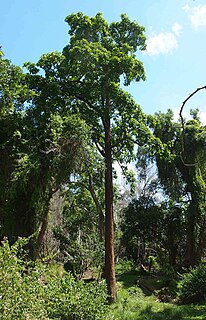
Nauclea orientalis is a species of tree in the family Rubiaceae, native to Southeast Asia, New Guinea, and Australia. It has many common names, including bur tree, canary wood, Leichhardt pine and yellow cheesewood. It grows to a maximum of around 30 m (98 ft) in height and has large glossy leaves. It bears spherical clusters of fragrant flowers that develop into golf ball-sized edible but bitter fruits. The yellowish to orange soft wood is also used for timber and in woodcarving and folk medicine. Much recently in Australia, it has been called the coronavirus tree because its flowerhead resembles the virus.
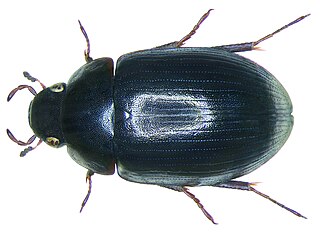
Hydrobius fuscipes is a species of beetles in the family Hydrophilidae that is found across much of the temperate Northern Hemisphere.

Cochleoceps orientalis, common name eastern cleaner-clingfish, is a species of clingfish that is endemic to the marine waters around southeastern Australia.
Iris dolichosiphon is a plant species in the genus Iris, it is also in the subgenus Iris and in the section Pseudoregelia. It is a rhizomatous perennial, from China and Bhutan. It has long, thin dark green leaves, very short stem, and dark blue, purple, or violet flowers. That are mottled with white. It has thick white/orange beards. It has one subspecies, Iris dolichosiphon subsp. orientalis, from China, India and Burma. It has similar flowers. They are cultivated as ornamental plants in temperate regions

Helochares is a genus of water scavenger beetles in the family Hydrophilidae, represented by 161 described species. It is distributed across the Afrotropical, Australasian, Indo-Malayan, Nearctic, and Palearctic realms.

Cymbiodyta is a genus of hydrophilid beetles with 31 species. Twenty–eight of the species occur in the Americas and three species in the Palearctic.

Coptocercus is a genus of beetles in the family Cerambycidae, mainly found in Eucalypts.


















